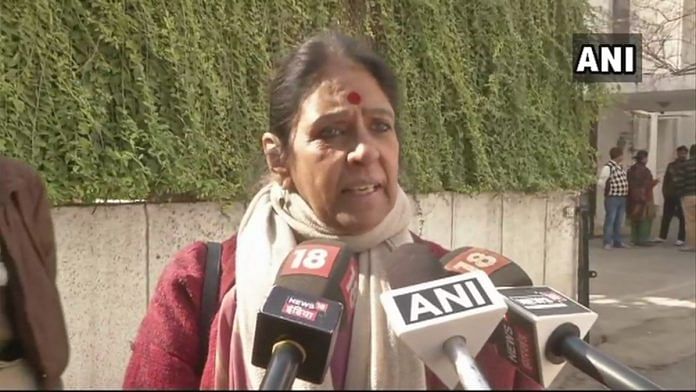New Delhi: A special CBI court last week convicted former Samata Party president Jaya Jaitly and two others in a 2001 corruption case relating to a defence deal.
Along with Jaitly, Judge Virendra Bhat also convicted party colleague Gopal Pacherwal and retired Major General S.P. Murgai.
The case was initiated on the basis of a sting, ‘Operation West End,’ conducted by news portal tehelka.com in 2001 to expose alleged corruption in defence deals.
ThePrint explains what the sting revealed and the subsequent legal proceedings in the case.
The sting
‘Operation West End’ claimed the jobs of India’s then defence minister George Fernandes, senior members of the ruling coalition, including then BJP president Bangaru Laxman, and at least five high-ranking members of the armed forces.
In the sting, reporters posed as representatives of a non-existent foreign arms company. They offered to sell thermal cameras and other equipment to the Indian Army. The hidden cameras recorded their dealings and the kickbacks accepted by politicians and Army officials.
Several charge sheets were filed by the CBI after the sting operation. Besides Jaitly, Murgai and Pacherwal, other accused included Laxman, defence ministry’s assistant financial adviser Narender Singh, and Samata Party treasurer R.K. Jain.
A special CBI court on 27 April 2012 sentenced Laxman to four years in prison. In October the same year, the Delhi High Court granted bail to Laxman on medical grounds. He passed away in 2014.
Fernandes, meanwhile, was reportedly given a clean chit by a one-man commission appointed to probe the scandal. The commission, comprising Justice (retired) S.N. Phukan, concluded that “no impropriety” had been committed by Fernandes in the purchases.
But the commission’s report was later boycotted by the UPA government and Phukan claimed that he “never said George Fernandes was innocent”.
Also read: Controversy borne out of Tehelka sting op had no substance in it: Jaya Jaitly
The case
The CBI had filed a charge sheet against Jaitly, Pacherwal and Murgai in 2006, charging them with criminal conspiracy and under the provisions of the Prevention of Corruption Act.
It had made the fourth accused — Surender Kumar Surekha, an industrialist from Kanpur — turn approver in the case. The case was registered against all the four on 6 December 2004.
The probe agency reportedly said that Tehelka reporters had sought assistance from Jaitly through Murugai and Surekha to obtain orders for equipment from the defence ministry.
The CBI also claimed in its charge sheet that for this purpose, Rs 2 lakh was allegedly given to Pacherwal at the instance of Jaitly. The transaction took place during a meeting at Fernandes’ house, with Murgai and Surekha also present.
A video recording of Jaitly purportedly showed her saying that she would put in a word to “Sahib’s office” if the firm was not considered. Surekha was also allegedly paid Rs 1 lakh for his services, while Murgai received regular payments.
The CBI court has now convicted the trio for criminal conspiracy and under other provisions of the Prevention of Corruption Act. Their arguments on the quantum of sentence will be heard on 29 July.
Tehelka’s credibility questioned
Tehelka was, however, caught in the middle of its own sting, with the government fighting back corruption allegations by questioning Tehelka’s methods.
It claimed that the allegations were based on misleading references and touched-up pictures. There were also reports that Tehelka reporters allegedly offered women as bait during the sting. The revelation had provoked a furore in August 2001 in the Lok Sabha with members, particularly those from the ruling coalition, demanding the arrest of the team involved in the filming of the tapes.
However, Tehelka justified using sex workers and taping the sex in its sting operation to expose corruption in defence deals, saying the motive justified everything.
Then Tehelka chief Tarun Tejpal had pointed out that they had taken an ethical decision not to put the tapes in the public domain as they felt that it would distract viewers from the real issues at hand.
“The purpose of the expose was not sex and sleaze. It was to nail the corrupt people in governance. Had we run even a frame of the sex, it would have distracted public attention from the larger issue of corruption,” he was quoted as saying.
However, when asked why the sex was taped, Tejpal had said that it was done for “functional reasons”. In response to an enquiry on why the reporter had offered his secretary to one of the officers, he had further said, “Money, booze and women are the done thing in arms deals. Moreover, the demand had come from their side. They insisted on it.”
Also read: Tarun Tejpal’s gaming of legal system shows why #MeToo doesn’t believe in due process



